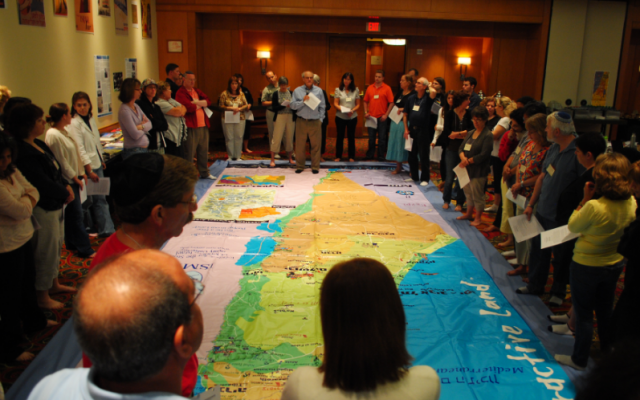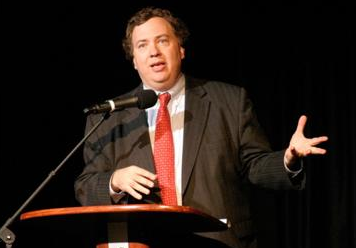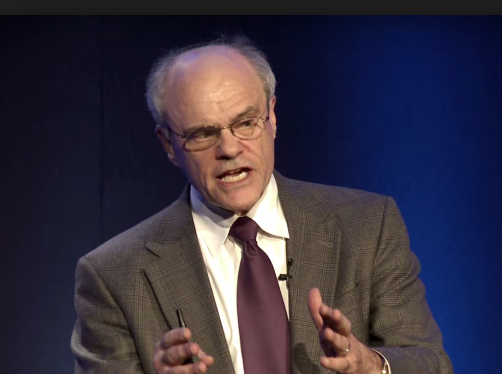Bahrain Workshop Reopens Peace Question
The Educator Enrichment Workshop on Modern Israel was conducted June 23-27 by the Center for Israel Education and the Institute for the Study of Modern Israel.

The Trump Administration’s recent opening shot at restarting the Middle East peace process got a tepid response in Atlanta from a prominent authority on the Middle East.
David Makovsky, who directs the Project on Arab-Israel Relations at The Washington Institute for Near East Policy, spoke June 26 in a prerecorded interview at the annual Educator Enrichment Workshop on Modern Israel. The workshop was conducted by the Center for Israel Education and Emory University’s Institute for the Study of Modern Israel.
Makovsky described last month’s administration-sponsored economic workshop in Bahrain as “basically an admission that the full Trump peace plan for the Middle East is not ready to go.”
During the final years of the Obama administration, Makovsky was a senior adviser to Secretary of State John Kerry on Israel-Palestinian negotiations. Makovsky is also a former editor of The Jerusalem Post.

He told the Atlanta conference for teachers and educational administrators that, “if the administration thought they had a good start with their peace plan they would have rolled it out together with the economic part.”
Last week, in a July 1 op-ed piece for The Washington Post, Makovsky reinforced his view that the fate of the economic plan will be determined by whatever political solutions the Administration is expected to put forward later this year.
“The White House’s inflexible approach,” he wrote, “means that if the final ideas offered by the political portion of the plan don’t gain support, the economic package goes down the tubes. The linkage is almost certainly doomed.”
The “Peace to Prosperity Workshop” in Bahrain, which was put together by President Trump’s son-in-law Jared Kushner and the administration’s Middle East envoy Jason Greenblatt, debuted an ambitious investment plan. Outlined in a 96-page document, the plan aims to fund billions of dollars in regional economic projects over the next decade. Over half of the money would go to Palestinians in the West Bank and Gaza through investments from the Arab world and the private sector.
Representatives from Arab nations such as Saudi Arabia, the United Arab Emirates, Qatar and Jordan attended. Israel was not invited, and the Palestinian Authority boycotted the meeting. Head of the Palestinian Authority Mahmoud Abbas proclaimed that “the deal of shame will go to hell.”
Palestinians face rampant unemployment and economic stagnation. They could use the money but are unlikely to modify many of their longtime political goals in exchange for the cash. Makovsky, who attended the Bahrain conference as an observer, commented that without a political plan to solve the Palestinian and Israeli stand-off, the economic proposal wouldn’t be getting much traction.
“Everybody’s going to say, where’s the beef? This is great. Sixty-two billion dollars over five or 10 years, but is it real money? Is it a vision that is going to be operationalized? If there is not a political plan, who is going to cough up that much money?”
During a July 3 conference call with reporters, Kushner said that “there is no plan to make these investments before achieving … political progress.” He described the Palestinian reaction to the plan and the Bahrain meeting as “hysterical and erratic and not terribly constructive.”

Still, it is not likely that there will be immediate proposals to address the important political questions that have confounded negotiators for decades. Any new proposals will have to wait until at least November, after Israel’s elections and the formation of a new government.
Even then, just a year before America’s national election, Makovsky wondered whether they would lead to a serious attempt at diplomacy.
“What is real here and what is aspirational, that is the question I keep asking myself. I think the later we get into the political cycle the more we are talking about aspirational than real. I think if the spectrum is on one side aspirational and the other side plans that you want to negotiate on tomorrow morning, I think we are moving further and further on the spectrum toward the aspirational side.”
The economic conference in Bahrain neatly coincided with the educator conference June 23-27. For the past 18 years, the summer institute has been presented by the CIE and ISMI.
Funding for the weeklong event has been provided over the years by The Avi Chai Foundation, which was financed by the prominent investor Zalman Bernstein. Kenneth Stein, who founded the program and has run it since its inception, this year handed the program over to Rich Walters, his associate director at CIE.



comments